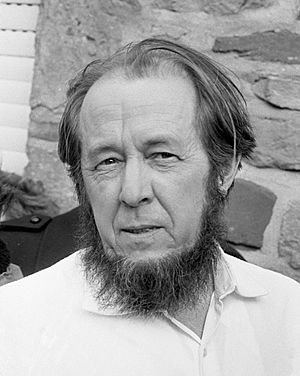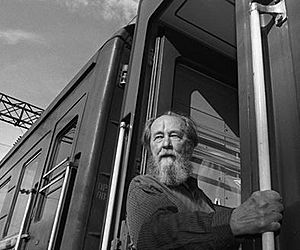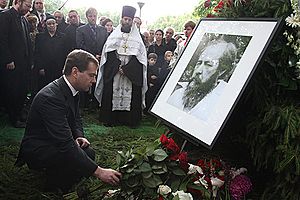Aleksandr Solzhenitsyn facts for kids
Quick facts for kids
Aleksandr Solzhenitsyn
|
|
|---|---|

Solzhenitsyn in 1974
|
|
| Native name |
Александр Исаевич Солженицын
|
| Born | 11 December 1918 Kislovodsk, Russian SFSR |
| Died | 3 August 2008 (aged 89) Moscow, Russia |
| Occupation |
|
| Citizenship |
|
| Alma mater | Rostov State University |
| Notable awards |
|
| Spouses |
Natalia Alekseyevna Reshetovskaya
(m. 1940; div. 1952)
(m. 1957; div. 1972)Natalia Dmitrievna Svetlova
(m. 1973) |
| Children |
|
| Signature | |
 |
|


Aleksandr Isayevich Solzhenitsyn (11 December 1918 – 3 August 2008) was a famous Russian writer. He was known for speaking out against the Soviet government. Solzhenitsyn helped the world learn about the harsh political control in the Soviet Union. He especially exposed the terrible system of labor camps called the Gulag.
Contents
Discovering Aleksandr Solzhenitsyn's Life
Solzhenitsyn was born in Kislovodsk, Russia. His father was Russian, and his mother was Ukrainian. He grew up during the Russian Civil War. His family's land was later turned into a collective farm. His mother encouraged his love for books and science. She also raised him in the Russian Orthodox Church faith.
During World War II, Solzhenitsyn was a captain in the Red Army. He was arrested because he wrote a private letter criticizing the Soviet leader Joseph Stalin. He was then sentenced to eight years in the Gulag. After his time in prison, he became a deeply religious Christian.
From Prison to Published Author
Thanks to a period of change called the Khrushchev Thaw, Solzhenitsyn was set free. He was also cleared of all charges. He started writing novels about the harsh rule in the Soviet Union. He wrote about his own experiences in the camps.
His first novel, One Day in the Life of Ivan Denisovich, came out in 1962. The Soviet leader Nikita Khrushchev even approved it. This book showed what life was like in Stalin's labor camps. Solzhenitsyn's last work published in the Soviet Union was Matryona's Place in 1963.
After Khrushchev was removed from power, Soviet leaders tried to stop Solzhenitsyn from writing. But he kept working on new novels. These books were published in other countries. They included Cancer Ward (1966) and In the First Circle (1968). He also wrote August 1914 (1971).
Exile and Return to Russia
In 1973, The Gulag Archipelago was published. This book made the Soviet leaders very angry. In 1974, Solzhenitsyn lost his Soviet citizenship. He was flown to West Germany. In 1976, he moved with his family to the United States. He continued to write there.
In 1990, his citizenship was given back to him. This was just before the Soviet Union broke apart. Four years later, he returned to Russia. He lived there with his wife until he passed away. He believed strongly in traditional Russian culture. He also felt disappointed with Russia after the Soviet Union ended. He wrote about this in books like Rebuilding Russia.
Solzhenitsyn also published short stories and poems. He wrote a memoir about his years living in the West. This book was called The Grain Between the Millstones.
Later Life and Legacy
Once back in Russia, Solzhenitsyn hosted a TV talk show. He would give a 15-minute speech twice a month. The show ended in 1995.
Solzhenitsyn died near Moscow on August 3, 2008, at age 89. He was buried at Donskoy Monastery in Moscow. Russian and world leaders honored him after his death.
He won the 1970 Nobel Prize in Literature. The prize was given "for the ethical force with which he has pursued the indispensable traditions of Russian literature." His book The Gulag Archipelago was very important. It strongly challenged the Soviet government. Millions of copies of the book were sold.
Solzhenitsyn's Impact
The Aleksandr Solzhenitsyn Center in Worcester, Massachusetts, helps promote his work. It also hosts his official English-language website.
His Most Famous Books
Many of Solzhenitsyn's works are based on his own life. He was held in the Gulag for many years. He also spent time in a cancer ward, from which he recovered.
After Khrushchev's Secret Speech in 1956, Solzhenitsyn was freed. His book One Day in the Life of Ivan Denisovich was published in 1962. Nikita Khrushchev himself approved it. Khrushchev said, "There's a Stalinist in each of you... We must root out this evil."
This means his stories often mix his real experiences with fiction. They also include his political thoughts.
Poetry
- Prussian Nights (1974)
- This is a long poem. Solzhenitsyn was a captain in the Red Army during World War II. Prussian Nights describes the Red Army's march across East Prussia. It focuses on the events Solzhenitsyn saw during that march.
Novels
- The First Circle (1968)
- The title refers to Dante's first circle of Hell. In Dante's story, this is where good people who lived before Christ stay. They can't go to Heaven, but they have some freedom in Hell. The story is about prisoners who are skilled workers or thinkers. They were arrested during Joseph Stalin's purges after World War II.
- Cancer Ward (1968)
- This novel is about a small group of cancer patients in Uzbekistan in 1955. It explores the idea of moral responsibility. The patients' tumors symbolize the harm caused by those who hurt others. During Stalin's Great Purge, many people were killed or sent to labor camps. The novel shows how people realize their part in these sad events.
- August 1914 (1971)
- This book is about Imperial Russia's defeat at the Battle of Tannenberg. This battle happened in East Prussia. The novel mixes fictional stories with historical facts. It caused a lot of debate. A new, much larger version was published in 1984. By then, Solzhenitsyn lived in the USA. He could publish parts that were not allowed before.
Short Stories
- One Day in the Life of Ivan Denisovich (1962)
- The story takes place in a Soviet labor camp in the 1950s. It describes one day in the life of an ordinary prisoner, Ivan Denisovich Shukhov. Publishing this book was a huge event in Soviet literature. It was the first time a story about Stalin's harsh rule was openly shared.
- For the Good of the Cause (1963)
- In this story, students in a town help build a new college. They do most of the work themselves. But when it's finished, Soviet leaders order that the building be given to a research institute. The students are told this is "for the good of the cause." The story criticizes the lack of freedom and honesty among political leaders at that time.
- Matryona's Place (1968)
- This is one of Solzhenitsyn's most widely read short stories. The narrator, a former Gulag prisoner, wants to live in the Russian countryside. He gets a job at a school on a collective farm. Matryona offers him a place to live in her small, old home. The narrator sees that the farm workers' lives are still very hard. Matryona works on the farm for little or no pay. One night, while helping others, she is killed by a train. Her character is seen as a symbol of Russia's suffering.
Non-fiction
- The Gulag Archipelago (three volumes, 1973–78)
- This book tells the history of the Soviet Union's secret police state. It describes how the system of labor camps was created and run. The book was secretly passed around in the Soviet Union. It was officially published there in 1989. After the dissolution of the Soviet Union, The Gulag Archipelago became required reading in Russian high schools. The word "archipelago" describes the system of labor camps. They were spread across the huge Soviet Union like a chain of islands. Only those forced to go there truly knew about them.
Related pages
Images for kids
-
Solzhenitsyn (right) and his long-time friend Mstislav Rostropovich (left) at the celebration of Solzhenitsyn's 80th birthday
-
Solzhenitsyn with Heinrich Böll in Langenbroich, West Germany, 1974
See Also
 In Spanish: Aleksandr Solzhenitsyn para niños
In Spanish: Aleksandr Solzhenitsyn para niños
- Literature covering the Gulag system
- List of refugees
- Ivan Bunin
- Czesław Miłosz
- Đoàn Văn Toại
- Wei Jingsheng
- Yevgeny Zamyatin



